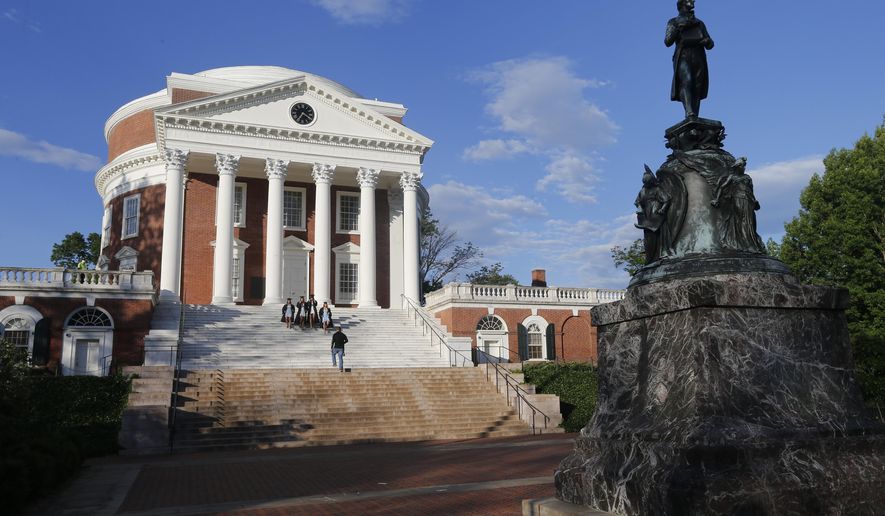The University of Virginia shells out $20 million a year to employees who work on diversity, equity and inclusion, according to a new analysis of the public school’s spending.
OpenTheBooks.com said the university has at least 235 employees whose job titles signal they do DEI work for the school.
They are paid a total of $15 million, and the state-funded school spends another $5 million on annual benefits, according to OpenTheBooks’ calculations.
The top-paid position is Martin N. Davidson, the school’s global chief diversity officer, who earns $452,000 from the university. Kevin G. McDonald, vice president for diversity, equity, inclusion and community partnerships is paid $401,465, the report says.
The school disputed the numbers and said the group miscalculated what is actually spent on DEI efforts specifically.
Mr. Davidson, for example, in addition to being chief global diversity officer, is also a tenured professor and acting executive director of the Contemplative Sciences Center, and his more than $450,000 in annual salary covers all of those positions.
“While we haven’t yet seen any detailed information about how this organization’s methodology, it seems to wildly overstate the total number of DEI employees at UVA and, thus, the cost,” said Brian Coy, a school spokesperson.
He said the school’s own analysis calculated there are 55 positions dedicated to DEI, at a school with more than 40,000 students, teachers and staff.
School spending on DEI has become a hot topic after the University of Florida last week shuttered its DEI office and cut 13 full-time positions and 15 faculty appointments.
“No such luck for learning at Virginia’s flagship university – founded by Thomas Jefferson no less. UVA has a much deeper DEI infrastructure,” said Adam Andrzejewski, founder of OpenTheBooks.
His outfit looked at the school’s 2023 payroll file to make its calculations, taking the positions and salary and then estimating an additional 30% in spending for benefits.
OpenTheBooks said the school funds various equity and diversity offices across its different specialties, as well as an Equity Center that says it “works to create mutually beneficial partnerships between UVA and the community that go beyond the standard of ‘first, do no harm’ toward justice and liberation.”
That office has 37 employees and 73 students who are paid for their work.
He said his calculations for the school don’t include faculty positions like the 10 professors in the Women, Gender and Sexuality Department, who collected more than $850,000 in salaries last year.
Nor does his study include Kimberly Barker, the Librarian for Belonging & Community Engagement at the school’s health sciences library. She makes $80,000 a year and is the library’s Inclusion Diversity Equity Accessibility lead.
Mr. Andrzejewski said they stand by their numbers and have made their data public.
“The university can cloak these efforts in seemingly innocuous language, but by now the public is savvy enough to understand the insidious worldview behind DEI and its implications for American civil society,” he said.
Mr. Coy, the school spokesman, defended the focus on DEI and pointed to a piece the school’s president, James E. Ryan, wrote for the Chronicle of Higher Education last spring complaining of a “steady stream of criticism” about the efforts but said schools need to take some of the criticism seriously and do a better job explaining what they’re doing.
He said equity has been twisted by some critics. But at its heart, it’s a version of equal opportunity.
“The term recognizes that not everyone starts in the same place or is in the same circumstances, so treating people exactly alike is not always fair — and not always consistent with providing equal opportunities,” he said.
Mr. Ryan said something like offering a ramp for someone in a wheelchair or financial aid to families with lower incomes would match that description.
But he said criticism about mandatory diversity training can cross the line into “enforced orthodoxy.”
He also said schools should “ensure as best they can” that money spent on DEI isn’t being wasted.
• Stephen Dinan can be reached at sdinan@washingtontimes.com.




Please read our comment policy before commenting.